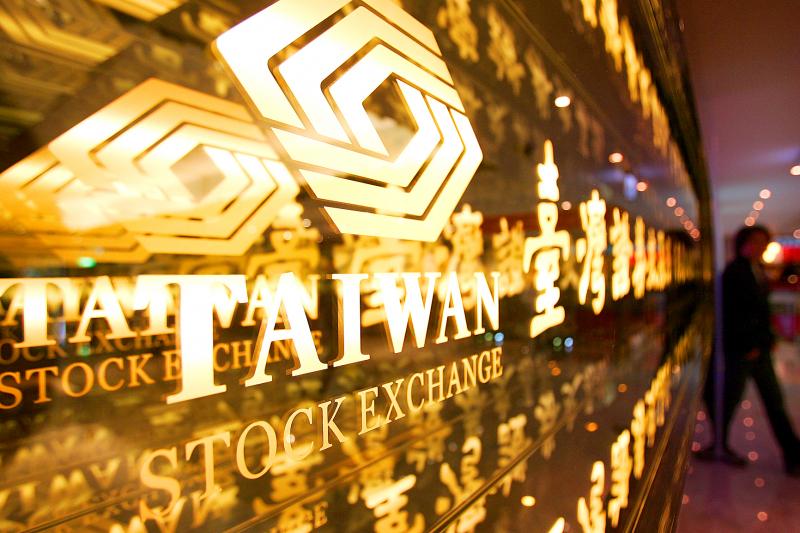The combined revenue of companies listed on the Taiwan Stock Exchange last month increased 11.97 percent year-on-year to NT$3.145 trillion (US$113.5 billion), the bourse said on Saturday.
The exchange said in a statement that 661 firms reported revenue growth, while 292 reported a decline.
The combined revenue of listed firms last grew 14.16 percent from August 2019, before COVID-19 was a factor, it added.

Photo: Bloomberg
The highest increases last month were reported in shipping and transportation; oil, gas and electricity; and plastics, the exchange said.
The uptick in the shipping and transportation industry came as imbalanced supply and demand dynamics amid the COVID-19 pandemic boosted freight volumes and rates, benefiting major players in the sector’s peak season, it said.
Evergreen Marine Corp (長榮海運), the nation’s largest container shipping firm in terms of fleet size, on Friday reported record monthly revenue of NT$50.02 billion for last month, up 9.03 percent month-on-month and 164.79 percent year-on-year.
Yang Ming Marine Transport Corp (陽明海運), the second largest, said revenue last month rose 11.34 percent monthly and 151.33 percent annually to NT$32.79 billion, while Wan Hai Lines Ltd (萬海航運), the third largest, saw revenue increase 21.49 percent from the previous month and 278.07 percent from a year earlier to NT$24.66 billion.
The oil, gas and electricity industry benefited from rising raw material prices for petrochemicals caused by higher oil prices, while plastics producers cited increased demand for products and rising prices as factors behind their rising sales, the exchange said.
Tourism, financial and insurance industries, and some electronics sectors reported relatively large revenue declines last month, as the tourism industry continued to be affected by COVID-19 disease prevention measures, it said.
Some companies in the electronics industry posted a drop in revenue as their customers underwent a product transition period, while revenue in the financial and insurance industry declined due to lower net income at insurers, it said.
Accumulated revenue for the 953 listed firms in the first eight months of the year reached NT$24.1 trillion, up 18.61 percent year-on-year, the exchange said, adding that the increase compared with the same period in 2019 was 16.45 percent.
Firms in the shipping and transportation, plastics, and iron and steel industries reported the highest revenue increases during the eight-month period, the exchange added.

MULTIFACETED: A task force has analyzed possible scenarios and created responses to assist domestic industries in dealing with US tariffs, the economics minister said The Executive Yuan is tomorrow to announce countermeasures to US President Donald Trump’s planned reciprocal tariffs, although the details of the plan would not be made public until Monday next week, Minister of Economic Affairs J.W. Kuo (郭智輝) said yesterday. The Cabinet established an economic and trade task force in November last year to deal with US trade and tariff related issues, Kuo told reporters outside the legislature in Taipei. The task force has been analyzing and evaluating all kinds of scenarios to identify suitable responses and determine how best to assist domestic industries in managing the effects of Trump’s tariffs, he

TIGHT-LIPPED: UMC said it had no merger plans at the moment, after Nikkei Asia reported that the firm and GlobalFoundries were considering restarting merger talks United Microelectronics Corp (UMC, 聯電), the world’s No. 4 contract chipmaker, yesterday launched a new US$5 billion 12-inch chip factory in Singapore as part of its latest effort to diversify its manufacturing footprint amid growing geopolitical risks. The new factory, adjacent to UMC’s existing Singapore fab in the Pasir Res Wafer Fab Park, is scheduled to enter volume production next year, utilizing mature 22-nanometer and 28-nanometer process technologies, UMC said in a statement. The company plans to invest US$5 billion during the first phase of the new fab, which would have an installed capacity of 30,000 12-inch wafers per month, it said. The

‘SWASTICAR’: Tesla CEO Elon Musk’s close association with Donald Trump has prompted opponents to brand him a ‘Nazi’ and resulted in a dramatic drop in sales Demonstrators descended on Tesla Inc dealerships across the US, and in Europe and Canada on Saturday to protest company chief Elon Musk, who has amassed extraordinary power as a top adviser to US President Donald Trump. Waving signs with messages such as “Musk is stealing our money” and “Reclaim our country,” the protests largely took place peacefully following fiery episodes of vandalism on Tesla vehicles, dealerships and other facilities in recent weeks that US officials have denounced as terrorism. Hundreds rallied on Saturday outside the Tesla dealership in Manhattan. Some blasted Musk, the world’s richest man, while others demanded the shuttering of his

Taiwan’s official purchasing managers’ index (PMI) last month rose 0.2 percentage points to 54.2, in a second consecutive month of expansion, thanks to front-loading demand intended to avoid potential US tariff hikes, the Chung-Hua Institution for Economic Research (CIER, 中華經濟研究院) said yesterday. While short-term demand appeared robust, uncertainties rose due to US President Donald Trump’s unpredictable trade policy, CIER president Lien Hsien-ming (連賢明) told a news conference in Taipei. Taiwan’s economy this year would be characterized by high-level fluctuations and the volatility would be wilder than most expect, Lien said Demand for electronics, particularly semiconductors, continues to benefit from US technology giants’ effort